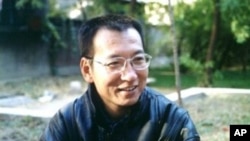Nearly two years ago, on a December night, Chinese authorities whisked away Liu Xiaobo, a long-time dissident whose Charter 08 calling for democracy and human rights in China was about to be published.
Now he languishes in a Chinese prison serving an 11-year sentence for "inciting subversion of state power."
By Friday, the literature professor could also be the 2010 winner of the Nobel Peace Prize for his extended efforts to promote democracy in the world's most populous nation.
The communist Chinese government, however, is not pleased at the prospect of Liu winning the award.
One of its diplomats told Norway's Nobel Institute director Geir Lundestad last summer that China does not believe Liu is the kind of person that the Nobel committee should consider for the award because he violated Chinese laws. But a group of 30 members of the U.S. House of Representatives asked President Barack Obama this week to urge Chinese President Hu Jintao to release Liu when the two leaders meet next month.
A group of 300 scholars, lawyers, factory workers and others in China have called on the Nobel Committee to hand the prestigious award to the 54-year-old Liu. He is believed to be a favorite and an Irish bookmaker is already paying bettors in advance who laid wagers on him winning the award.
The "subversion" Liu was convicted of was his seven-page call for a peaceful transformation from communist rule in China to a government based on the "universal human values" of freedom. It is a document that has been signed by thousands of Chinese.
He was first jailed for two years for supporting the 1989 Tiananmen Square protest and, later, another three years for his writings that questioned the role of China's single-party political system.
Liu's 11-year sentence is believed to be one of the longest handed down in China in a freedom of expression case. Human rights activists have deplored his imprisonment, with Amnesty International calling it a "stark reminder" that China does not tolerate free speech.
The highly educated Liu has been a visiting scholar at several universities outside of China, including Columbia University in New York and the University of Oslo. But it is Charter 08 that has given him world renown and left him imprisoned.
At his two-hour trial last December, Liu was prevented from reading a personal statement. It expressed his hope for China's future.
"I hope that I shall be the last victim of China's unending imprisonment of writers," he wrote, "and that no one else will be made a criminal for what they say."
Some information for this report was provided by NYT, Reuters, guardian, bloomberg.





